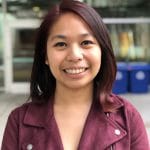
By Guest Author Dawn Angelicca Barcelona
When I decided to apply for a Fulbright grant, I was ready to tell the selection committee that I had done it all: double majored, founded an organization, was the president of my sorority, won multiple awards for my poetry, led ESL workshops at a writing center, and worked three internships in both writing and human resources.
At my university, we had fellowship advisors who would read over our personal statements before submitting them to Fulbright. I was proud of what I had written – a narrative of how I became a leader in college through my organizations, jobs, and academics.
When I met with my advisor, she said one thing that has resonated with me ever since.
“This essay tells me what you’ve done. But I know nothing about you. Who is Dawn?”
I went home feeling completely discouraged. I stared at my personal essay for days before I started rewriting it. As the deadline neared, I asked myself, “Who am I now and who will I be after I complete this fellowship?” That question changed my perspective, and I began to write again.
My advisor was pleased with my edit – she told me that it was a much more compelling story and showed who I am.
Here are four tips to get started on writing a more authentic personal statement.
1. Talk to a friend about the story you want to tell
You’ve probably told some of your friends about your plans to apply for a fellowship. Talk to them about your motivations for applying and some key events that inspired you to immerse yourself in a research project or the opportunity to work abroad. Be casual and candid with them and then ask them to summarize what you’ve said. Ask them what stood out, such as words or phrases that painted a vivid picture of what you hope to get out of the grant. Use those phrases in your first draft.
2. Put that resume away
It can be easy to rely on the crutch of elaborating on your resume while writing your first draft. After all, you’re proud of what you’ve done and have honed the qualifications you need for this application process. Instead of doing a play-by-play of what you’ve accomplished, try writing about how your perspective was challenged through an experience and how you managed that. What did you learn? What would you have done differently if you could go back?
3. Visualize who you want to be when your fellowship is done
When we first decide to apply to a fellowship, it’s natural to fix your attention on how to win that fellowship, who you’ll ask for recommendations, and the prerequisites you need to complete to begin your application. However, stop to reflect on who you might be at the end of the fellowship. What knowledge do you crave more of, and what will you do with that knowledge? What will the opportunity to live abroad do for your personal growth and your professional goals? What connections do you want to make during your fellowship and why? Craft the answers to these questions into a truly personal story of why you’d like to complete this fellowship.
4. Get started writing
If you’re having trouble getting started, try setting a 15-minute timer for yourself to write whatever comes to mind in regards to this fellowship. Tell yourself to write more casually, as if you’re writing this up to send to a friend, so that you don’t feel constrained by formal language. You might explore the first time you heard about the opportunity, a research topic you haven’t been able to dedicate time to, or perhaps a personal story that pushed you to go beyond your boundaries. Write without editing along the way – that will distract you from your thought process.
Even if your first try at your personal statement reads like a stream of consciousness novel, it’s best to get all of your thoughts down before editing. Take comfort in the fact that whatever you write first will not be the final draft. After you’re done writing, highlight parts of your draft that you like. Use a different color to highlight parts you think are important to your personal statement but need to be expressed more articulately. Gather the lines, phrases, or words that you’ve highlighted, and expand upon those thoughts. Repeat, repeat, repeat.

© Victoria Johnson 2019, all rights reserved